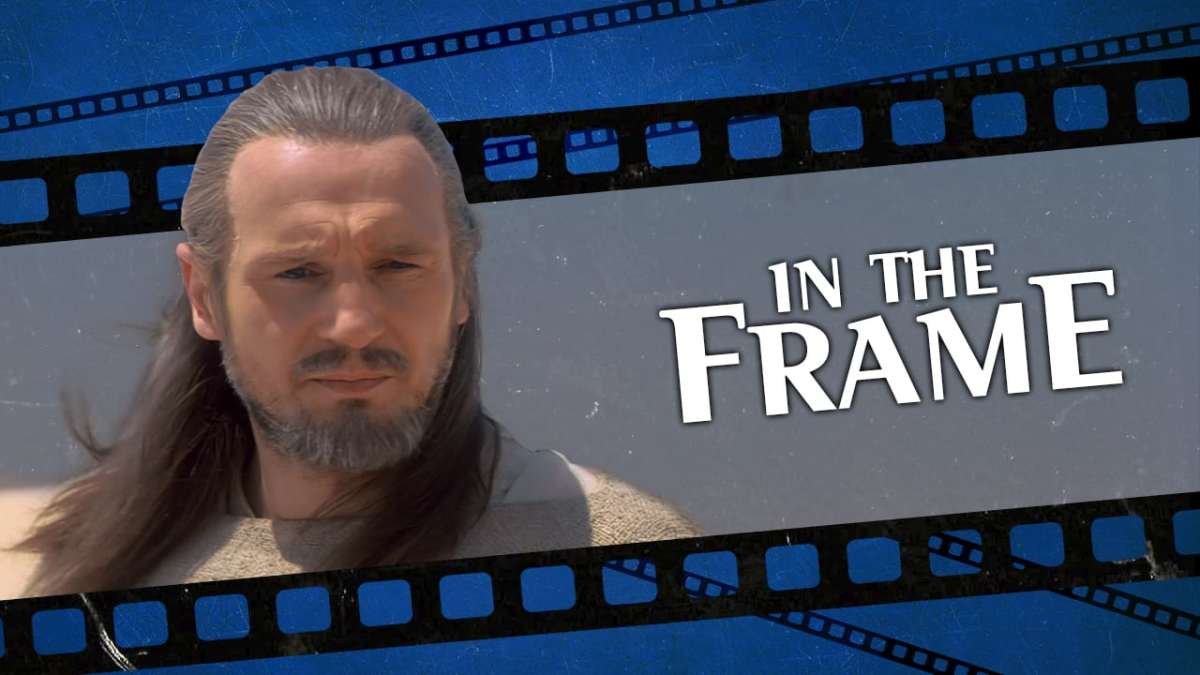This week, the internet’s attention fell to a viral clip from Disney Gallery: The Mandalorian, the eight-part documentary looking at the production and development of that live-action Star Wars series. In the viral clip, from the episode “Legacy,” Dave Filoni discussed the significance of “Duel of the Fates,” the John Williams track from the climax of The Phantom Menace.
Filoni argued that the climax of The Phantom Menace was essentially an extended metaphor, that the fates dueling over Naboo were locked in a battle for the soul of Anakin Skywalker. Darth Maul (Ray Park) represented evil, with Qui-Gon Jinn (Liam Neeson) representing good. As any fan knows, The Phantom Menace features the death of Qui-Gon Jinn at the hands of Darth Maul.
It’s an interesting read on the sequence, even if it seems a little too simplistic in its assessment of Qui-Gon Jinn. Qui-Gon is one of the most noteworthy characters in Star Wars canon, but not because he represents some Romantic ideal. Qui-Gon is a compelling figure because he’s inherently tragic — he is a deeply flawed individual who makes a series of bad choices.
In their famous feature-length video review of The Phantom Menace, the crew at Red Letter Media made an argument that The Phantom Menace suffered because it didn’t have a conventional protagonist. This is a perceptive assessment because it gets at an immediate issue with the film while also hinting at a much larger structural choice on the part of George Lucas.
Superficially, Qui-Gon looks like he should be the protagonist of The Phantom Menace. He is something of an unorthodox figure in the Jedi Order who has found himself assigned to what initially appears to be a thankless brief. He must settle a trade dispute on the “small planet of Naboo,” convinced that “the negotiations will be brief.”

However, Qui-Gon quickly finds himself caught up in an adventure that involves smuggling Princess Padmé Amidala (Natalie Portman) off Naboo and finding a young boy with great potential named Anakin Skywalker (Jake Lloyd) on Tatooine. Qui-Gon is convinced that Anakin is capable of great things and even leads a mission to help Padmé reclaim her planet from the Trade Federation.
Qui-Gon Jinn is very much the hero of this sort of story, the basic outline of which recalls contemporaneous Bruce Willis films like Mercury Rising or The Sixth Sense. This is a story about a wise older man helping younger children. Even the casting of Liam Neeson suggests a similar dynamic, evoking his (to that point) most famous role as Oskar Schindler in Schindler’s List.
However, the reality is decidedly more complex. The audience doesn’t entirely accept Qui-Gon as the hero of the narrative because of the narrative gravity exerted by Anakin Skywalker. The audience watching the film expects The Phantom Menace to play as an origin story for Darth Vader, something played up by the publicity materials.
It’s notable that Qui-Gon is largely surrounded by characters that audiences will recognize, like his apprentice Obi-Wan Kenobi (Ewan McGregor) and Yoda (Frank Oz). Even from The Phantom Menace, audience members can intuit the importance of Padmé Amidala as Anakin’s future love interest or Senator Palpatine (Ian McDiarmid) as the future Emperor.

As such, the audience is immediately aligned against Qui-Gon Jinn. He is the most important character in this prequel who has no role in the original Star Wars films. If Qui-Gon really were important, the logic goes, his name would have been mentioned at some point over the course of those classic three films. The audience understands immediately that he cannot be the hero.
The Phantom Menace repeatedly and consciously emphasizes this tension within the narrative — the fact that Qui-Gon occupies the narrative role of a hero, while the audience understands that he cannot serve that purpose. The Phantom Menace suggests that Qui-Gon himself fundamentally misunderstands his role in this particular story.
Qui-Gon is presented as something of a rogue. He is an unorthodox figure and seems to have been quietly pushed to the margins. “If you would just follow the code, you would be on the council,” Obi-Wan laments. However, there is more to it than that. Qui-Gon seems to have allowed himself to become disconnected from the Force.
In the opening scenes of the film, Qui-Gon and Obi-Wan wait for representatives of the Trade Federation to begin negotiations. It is transparently an ambush. “I have a bad feeling about this,” Obi-Wan notes. Qui-Gon simply responds, “I don’t sense anything.” This is Qui-Gon’s arc in a nutshell. The character wanders into traps that the audience see lying ahead of him.
When Qui-Gon lands on Naboo, it takes him quite a while to realize that Anakin is Force-sensitive. Notably, Qui-Gon needs to use a test to verify this. This is the only major example of using such a test to determine a character’s Force sensitivity in the film franchise. It suggests that Qui-Gon is out of touch with the Force and with his role as a Jedi Knight.

Audiences understand this, cognizant of the fact that Anakin Skywalker will become Darth Vader and that he will be a major part of the fall of the Galactic Republic. Qui-Gon believes completely in a prophecy that Anakin will “bring balance to the Force,” which isn’t unreasonable in a world as mystical as Star Wars. However, the audience is aware of Qui-Gon’s blindness from the outset.
The Phantom Menace reinforces this idea during Qui-Gon’s time on Tatooine. Padmé is horrified that slavery still exists in the galaxy. Anakin imagines that the only reason that a Jedi Knight would come to Tatooine would be to end slavery. “Have you come to free us?” Anakin asks. When Qui-Gon regretfully says no, Anakin presses the point, “Why else would you be here?”
Star Wars repeatedly stresses the power of the Jedi to effect meaningful and just change. In The Phantom Menace, Qui-Gon and Obi-Wan assist Padmé in reclaiming her throne. Notably, in Return of the Jedi, Luke returns to Tatooine to topple the Hutt family before completing his hero’s journey. All of this exists in marked contrast to Qui-Gon’s ineffectiveness on Tatooine. Qui-Gon could end slavery on Tatooine, if he wanted.
More to the point, Qui-Gon’s interest in Anakin is strictly utilitarian. He is not moved to free a young boy born to slavery. He is motivated to liberate Anakin because he believes Anakin is the Chosen One. “Can you help him?” asks Shmi (Pernilla August), Anakin’s mother. “I don’t know,” Qui-Gon responds. “I didn’t actually come here to free slaves.”
Qui-Gon is more than passively tolerant of slavery. He is actively complicit. He buys Anakin from Watto (Andy Secombe), but only so the child might be taken to Coruscant for his own purposes. It is debatable whether Qui-Gon actually “frees” Anakin or simply traps him in a slightly different system. Qui-Gon makes only the most halfhearted effort to avoid separating Anakin from Shmi.

The prequel trilogy stresses complicity in slavery as one of the cardinal sins of the Galactic Republic. In Attack of the Clones, the fate of the Republic is sealed when it agrees to employ an army of cloned slaves against the Separatists.
Of course, the prequels are messy and unfocused. Some of this gets a little muddled, particularly in Attack of the Clones, which seems to argue that Shmi found happiness when in slavery when she was sold to a lonely old moisture farmer named Cliegg Lars (Jack Thompson). It’s a strange choice, albeit one that serves largely to bridge the continuity between the prequels and the original trilogy.
Still, Qui-Gon Jinn is ultimately a failure. He is retroactively rendered as the prototypical “bad dad” of the Star Wars franchise, the father who messes up the lives of those in his care. His mistakes, anchored in an unearned sense of certainty and righteousness, have dire consequences for Anakin, Obi-Wan, and the galaxy at large.
After all, Qui-Gon doesn’t even manage to defeat Darth Maul at the climax. He doesn’t fulfill that most basic of heroic functions: vanquishing the villain of the piece. This renders Qui-Gon as a failed hero in the most literal of senses. There are a lot of problems with the storytelling in the prequels, but Qui-Gon’s arc is very consciously and deliberately dysfunctional.
Qui-Gon Jinn does not represent the light or the dark within Anakin; he represents something far more complex and compelling.






Published: May 15, 2020 11:00 am